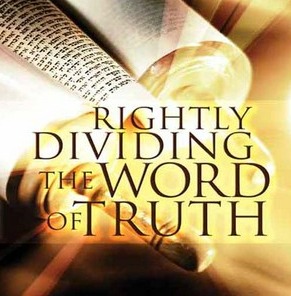Is everything in the gospel of Matthew applicable to Christians?
by Grant
(near L.A.)
Historically speaking, Jesus was the Jewish Messiah to Jews who lived in the land of Israel under the law of Moses in the first century A.D. His message was aimed at His target audience. Doctrinally, because much of what Jesus says in the gospels was aimed at His Jewish audience, it is not doctrinally applicable to Christians, 2 Timothy 3:16.
Jesus was not the Chinese Messiah or the Irish Gentile Messiah to America. Jesus' doctrinal message was for a particular people at a particular time in history in a particular geographic location which God delights to observe, Deu 11:12, for particular reasons such as the fulfillment of Old Testament prophesies.
Jesus did also minister to Samaritans, John 4, 2 Kings 16:42, 17:24, and to the woman of Sidon, Matthew 15 and others but His earthly ministry was mainly to Israel. Many of Jesus' teachings are applicable to everyone, in the sense of reproof, correction and instruction in righteousness, 2 Tim 3:16. For example, we must be careful how we judge others, Matthew 7:1ff
"All scripture is given by inspiration of God, and is profitable for doctrine, for reproof, for correction, for instruction in righteousness..." 2 Timothy 3:16What Jesus says in the gospels is certainly profitable for reproof, correction and instruction in righteousness but we are also admonished to "rightly divide the word of truth," 2 Tim 2:15, so we would not apply most of Matthew doctrinally to Christians.
Rightly dividing the word of truth means we must interpret scripture in context, applying it as God intended. That means we must deal honestly with: cultural, doctrinal, historical, linguistic, literary and religious context.
I understand the Gospel of Matthew to be a transitional book, segueing from the Old Testament to the New Testament, from ministry to Israel to ministry to the church. As a transitional book, most of Matthew depicts events which happened before the crucifixion and resurrection of Messiah, while the law of Moses was still in effect.
Jesus said: "For all the prophets and the law prophesied until John." Matthew 11:13. "Until" means up to and including John the Baptist. "Until" indicates that John the Baptist marks the end of the old covenant, making possible the beginning of the new covenant.
"Wherefore then serveth the law? It was added because of transgressions, till the seed should come to whom the promise was made; and it was ordained by angels in the hand of a mediator." Galatians 3:19.Scripture tells us the Law is "till" the seed should come. The seed is Jesus Christ, our Messiah, Galatians 3:16. The law of Moses was a temporary institution whose purpose was to point to Christ.
"For Christ is the end of the law for righteousness to every one that believeth." Romans 10:4."End" means both fulfillment and termination.
"For if that which is done away (the Old Covenant of Law) was glorious, much more that which remaineth (the New Covenant) is glorious." 2 Corinthians 3:11.The New Covenant went into effect in Matthew 27:50 when Jesus died on the cross, Ephesians 2:16, Hebrews 9:16. We can certainly apply anything in Matthew for purposes of reproof, correction and instruction in righteousness but most of Matthew does not apply to us doctrinally because it is aimed at a Jewish audience.
For example, Matthew 5-7 is the Constitution of the Kingdom of heaven. When the Jews rejected Jesus as their Messiah, the kingdom was with- drawn. That is why, after the resurrection of Christ, one of the first questions the apostles asked Jesus in Acts 1:6 was: "Wilt thou at this time restore again the kingdom unto Israel?"
It is also important to observe that no one in Matt 5-7 talks about justification by faith. Messiah is speaking in person to:
circumcised
law-keeping
pork-abstaining
Moses-following
temple attending
shrimp-rejecting
Hebrew-speaking
sacrifice-offering
patriarch-exulting
sabbath-observing
literal physical Jews
in the land of Israel
under the law of Moses.
The nation of Israel was a particular people at a particular time in history, in a particular location, the land of Israel which G-d loves, Deu 11:12, set apart by God for His particular purpose under particular laws which God did not enforce against the surrounding nations.
That is why God did not threaten to drive the Egyptians out of Egypt or the Grecians out of Greece or the Romans out of the Roman Empire if they violated His law. Yet God did make that threat to people who lived in the land of Israel, Leviticus 18:24-28, and carried out His threat when they violated His law.
For most of his earthly ministry, Jesus aimed His message at Jews. He interacted to a small degree with a few Samaritans (part Jewish and part something else) and with a few Sidonians but for the most part, His ministry was not to Gentiles, Matthew 10:5-6, therefore in the wisdom of God, Jesus' message was different than the Pauline message.
Jesus chose Paul to be the apostle to the Gentiles and revealed information to him that was not previously revealed to anyone else: Acts 9, Rom 16:25-26, 1 Cor 15:7, Gal 1:11-17, Eph 3:3ff. That accounts for the difference in message that we see between Matthew and the Pauline epistles.
I am sure you have already noted in your Bible study that scripture instructs us to follow Paul as he followed Christ: Acts 26:29, Rom 11:14, 1 Cor 4:16, 11:1, Gal 3:1, 4:12, 1 Thess 1:6, 2 Thess 3:7, 9, 1 Tim 1:16, 2 Tim 3:10-14. Please do yourself a favor and look up these verses.
Walking with the Lord after the resurrection of Christ is different than walking with the Lord in the Old Testament and walking with the Lord during His earthly ministry. We have the perman- ently indwelling Holy Spirit, Eph 1:13-14, some- thing Jewish believers did not have before the crucifixion and resurrection of Christ.

Do you know the
meaning of idolatry?
Do you know the real
meaning of arsenokoitai?
Who is Jesus?
What must I do
to be saved?
Return to Sermons
Return to 101 Community
Return to
Gay Christian 101 Home Page



